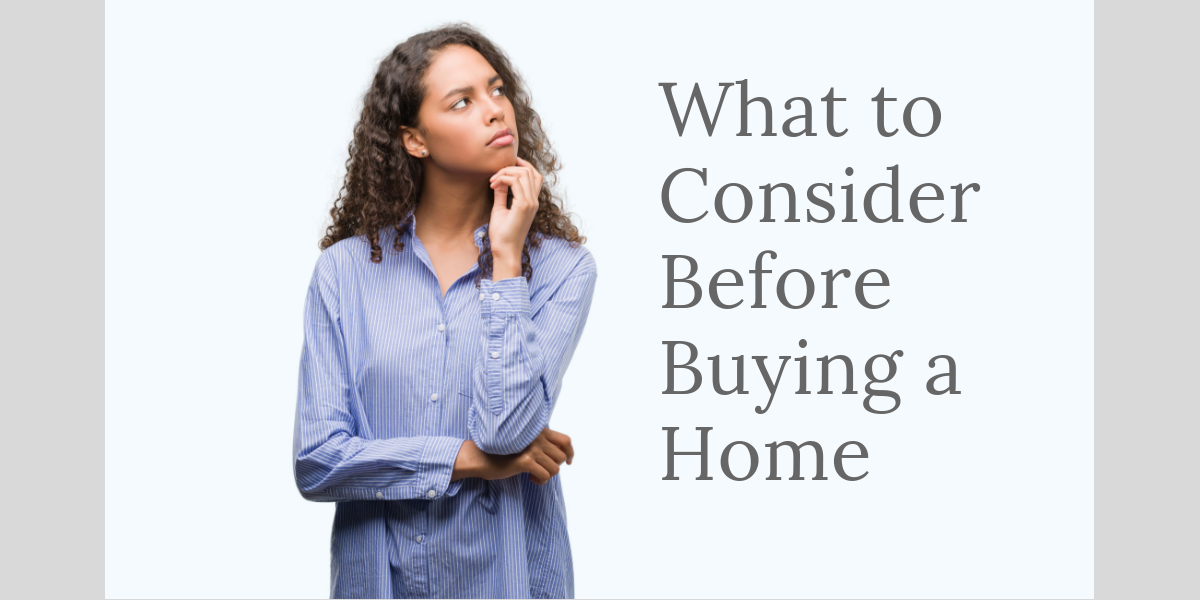
Deciding whether you’re ready to purchase your first home is perhaps one of your life’s major decisions. Buying is a huge (not to mention expensive) commitment and isn’t a decision you should take lightly. Before you make the leap to homeownership, it’s imperative you know where you stand, what you want, and what’s realistic for you and your financial situation.
Here are 5 questions to ask yourself before buying a home:
- “How much can I really afford?”
One of the biggest mistakes first time home buyers make is stretching their budget and buying a house they can’t afford. Before you start looking for your dream home, you should sit down, write out a budget, and figure out exactly how much you’re comfortable paying per month.
Keep in mind that owning a home is more than just a mortgage payment. In addition to your mortgage, you’ll need to cover additional home-related expenses, like homeowners insurance, mortgage insurance, property taxes, and maintenance.
- “What kind of shape are my finances in?”
Before you purchase your home, it’s imperative you take stock of your financial situation. The state of your finances plays a huge role in how much lenders will approve for your mortgage, and before they approve your loan, the banks will dig deep to make sure you’re a qualified applicant. Your financial situation will also affect the interest rate on your loan, which can save or cost you hundreds of dollars per month.
When deciding whether to approve your mortgage, the banks will look at:
- Your credit history, including your credit score, delinquent payments, and overall balances
- Your debt, including credit cards, student loans, personal loans, and auto loans
- Your income
- Your employment history, including your salary history and your length of employment
- Your savings and the amount available for a down payment
Essentially, your lender is going to review your financial history to determine whether they believe you will pay back your loan. If they feel you’re a risky candidate, they’ll either approve a loan with a high interest rate – or turn down your loan application..
Before you apply for a mortgage, it’s important to get your finances in the best shape possible. Review your credit report and ask for any inaccuracies to be removed. Work on paying down your debt and padding your savings. The better your financial situation, the better deal you’ll get on your mortgage.
- “What are my must-haves, my nice-to-haves, and my can’t-haves?”
Before you buy a property, it’s important to iron out the details of exactly what you’re looking for. You should break down the qualities of your future home into three lists:
- Must-haves
- Nice-to-haves
- Can’t-haves
Your must-haves are the qualities you absolutely need in a home in order to move forward with a purchase. A must-have might be a home in a preferred neighborhood, enough bedrooms or potential future bedrooms and bathrooms to accommodate your family, or a backyard where your kids can play.
Your nice-to-haves are things you’d ideally like to have in a home but aren’t deal-breakers if they’re missing. Nice-to-haves might include an updated kitchen, a spacious master bedroom, or a finished basement.
Your can’t-haves are the qualities you absolutely don’t want in a property. These are the deal breakers that will keep you from purchasing a home. Can’t-haves might include a property that borders a busy street, a fixer-upper property that needs a lot of work, or a property that’s too far away from your job site.
Once you have these three lists, it will be easier for you and your real estate agents to judge potential properties and narrow down the list of homes to view.
- “Do I know where I want to live?”
When it comes to real estate, one of the more important things is location. And before you purchase property, it’s important you iron out exactly what you’re looking for in a location.
Do you want to live in the center of a city or out in the country? Do you want to live in a residential neighborhood or in a more developed area? Is it more important to be close to your job or close to shops, restaurants, and entertainment?
Once you know everything you’re looking for in a location, your real estate agent can suggest neighborhoods that match your criteria.
5. “When do I want to move?”
When you move is also an important factor to take into consideration. There’s no “best time” of the year to move, but different times of the year have different advantages.
If cost is your top concern, you might want to consider moving in the winter, when prices are traditionally at their lowest. If being able to see a wide variety of home choices is more important to you, then plan to look at properties in the spring and summer, when available inventory peaks.
 Facebook
Facebook
 X
X
 Pinterest
Pinterest
 Copy Link
Copy Link
